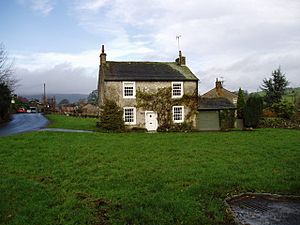Erection of Cottages Act 1588 facts for kids
| Act of Parliament | |

|
|
| Long title | An Act against the erecting and maintaining of Cottages. |
|---|---|
| Citation | 31 Eliz. 1. c. 7 |
| Dates | |
| Royal assent | 8 March 1589 |
The Erection of Cottages Act 1588 was an important Act (a law) passed by the Parliament of England. This law made it illegal to build most new homes, called cottages, in England unless they had at least 4 acres (about 1.6 hectares) of land connected to them. This land had to be owned by the person building the cottage.
Why Was This Law Needed?
During the time of Elizabeth I of England, many people believed something interesting. They thought that if a person and their friends built a house on unused land overnight, they could then keep it. This was often done by "squatters" on common land, which was land shared by everyone in a village.
However, these quickly built cottages caused problems. The government recognized these issues. So, the Erection of Cottages Act 1588 was created to deal with the large number of these unofficial homes. Its full name was "An Act against the erecting and maintaining of Cottages."
What Did the Law Say?
The main goal of the 1588 Act was to make it harder for squatters to build new homes. The law stated that any new cottage had to come with a minimum of 4 acres (about 1.6 hectares) of land. This rule was meant to ensure that new homes were properly planned and supported.
The Act officially became law on March 8, 1589. There were some ways to get around the law. Poor people could ask for special permission from the Quarter Sessions (a local court). But they also needed approval from the lord of the manor, who owned the land. The law also did not allow people to take in lodgers or divide their houses into smaller living spaces.
Why Was the Law Changed?
| Act of Parliament | |

|
|
| Long title | An Act to repeal an Act, passed in the Thirty-first Year of the Reign of Her Majesty Queen Elizabeth, intituled, "An Act against the erecting and maintaining of Cottages." |
|---|---|
| Citation | 15 Geo. 3. c. 32 |
| Dates | |
| Royal assent | 22 May 1775 |
| Other legislation | |
| Repealed by | Statute Law Revision Act 1871 |
|
Status: Repealed
|
|
The Erection of Cottages Act of 1588 stayed in place for a long time. However, it was eventually cancelled by a new law called the Erection of Cottages Act 1775. This happened on May 22, 1775.
The main reasons for getting rid of the 1588 law were clearly stated. The old law had made it very hard for poor people to find a place to live. It was also thought that the law might have caused a decrease in the number of people living in England. The 1775 Act aimed to fix these problems.


